Lessons from the Dust
On housecleaning, grief, and making room for something new to arrive.
Dear Friends,
June nights have always made me restless.
When I was a kid, June made me feel like a hermit crab that had grown too big for its shell. As the school year with all its failures and disappointments inched to a close, everything from the clothes in my closet to the positions of my bedroom furniture would begin to feel unbearably tight and confining.
The old ways weren’t working for me any more, but new options had not yet arrived.
Something about this feeling has always driven me to rearrange my room. I find myself in that state again today, washing walls and baseboards as though eradicating the film of dust that coats my life will cleanse the world of all evil.
When I was a teenager, my Dad would hear these rumbles and crashes coming from my room late at night and would comment that it reminded him of his mother. Apparently my Nana was possessed by a similar furniture-arranging demon, and my Dad and his brothers would occasionally come home to find a house cleaned and re-shaped in a frenzy of fey energy.
The qualities I share with my Nana have always made me feel strangely connected to her, despite the fact that during her life we treated one another a lot like a pair of cats who couldn’t manage to settle a territorial dispute.
My Nana was vocally opposed to education for women and made it clear that there were immutably right ways— her ways— to think, look, and behave as a Good Catholic Girl. I was both desperate to please and constitutionally incapable of agreeing with her, which led to a disorganized approach of taking her advice about hair sets and girdles and Never Showing Your Shoulders In Church while self-loathingly remaining in the Honor Society.
I sit here now in my fresh-smelling, recently rearranged room on a muggy June night and I think about the sense of suffocating confinement I always feel in the lead-up to these frenzies of heavy housework. I wonder if my Nana— a mid-century housewife whose oldest son had a car before she did— felt something like this when she began tugging at the edges of the sofa.
There is a feeling, right before the furniture begins to move, that it would be impossible to continue living with things the way they are. That some thwarted force of change will rack my life apart if it does not find a way forward, a way through.
It feels anachronistically housewifeish to say, but there is something about moving matter in physical space that opens up new channels of efficacy and imagination.
In the end, I don’t think the mysterious force that wants my bed moved against a new wall is all that different from the force that moves us to rearrange the structure of the wider world. Allowing distress to spur us to tangible action is a powerful practice, and it is infinitely available at our fingertips if we stop thinking and start doing.
Imperfect as I am at it, cleaning my own space connects me, a person whose intellect-driven day job deals in digital ether, to what the scrubwomen and housewives and laborers who programmed my DNA knew in their bones: that the work of the body is essential work.
When I finally lie down exhausted on a bed of freshly laundered sheets, I have reminded myself of what I am capable of: clearing a path where there wasn’t one before.
Look— a way around, where before there was obstruction.
A breath of fresh air where there was rot.
Our sphere may be small, but we are not powerless.
This past week, Rev and I went to Opus 40 for the first time. I didn’t know much about it before we arrived, and it was unexpectedly stunning. Built from an old bluestone quarry, the whorls and undulations of a massive sculptural landscape took nearly 40 years of one man’s ceaseless labor to create.
The place felt like a reminder of the force we have available inside us when we bend it to a purpose; however small, however strange. There is something very satisfying about the way the sculpted landscape feels both solid and moving, like a visual representation of the outward ripples of an intentional life.
Our labor does not need to result in a nine-ton obelisk to have this kind of power. I have known musicians who stir people to ripples of ecstatic dance and chefs whose symphony of flavor moves people to tears. Any job well done reshapes the world, a sculpture just makes this truth immediately visible.
Opus 40 also felt like a reminder of what we can each accomplish if we repeatedly re-orient our labor and attention to our own vision in spite of all the forces working against our sense of agency.
The sculpture reminded me of a project I did a few years back, when I had a series of conversations with people who seemed particularly satisfied with their life’s work.
A theme kept reappearing in those conversations, one that irritated me at first. All of these people said something along the lines of:
At some point I became clear about what I really wanted to do, and then I did it.
It took me awhile to accept what they were saying.
It wasn’t that they didn’t encounter obstacles, or that they had secret wells of money or time inaccessible to the rest of us, or that they knew all along that things would work out. It wasn’t even that they ended up accomplishing what they set out to do in some precise way, without having to bend and compromise and adjust as part of the bargain.
No— I think what these satisfied people meant is just that there is really something about a wholehearted commitment to a job of work that opens up inner resources to do what is required.
So when I tackle the basement or the attic or the piles under the bed, maybe it’s a kind of etude for this way that I want to live. An exercise in learning to trust a vision and my ability to carry it out.
Two years ago, a chronic illness I’d been refusing to deal with caught up with me. Finding myself unable to effectively work, think, or do much of anything but be exhausted and in pain, I started sitting quietly each day with the comforting certainty that at least I would die someday, and on that day the pain would end.
I watched all the things that had propped up my identity: my band, my writing projects, my ability to do my job or my community volunteer work— drift farther and farther away until they were gone. I became nobody.
Before that time, so much had seemed impossible to change. Any time I wanted to accomplish a goal, there seemed to be a thousand things working against it. I was hit by a car, my house flooded, my car bit the dust, a professional license wouldn’t transfer to a new state, my health collapsed.
At the very bottom of it all, I looked around and saw a hundred thwarted paths and no clear way out. I had spent my youth ceaselessly grinding after a life that had never materialized. Half-finished novels in a drawer. An album that I was too sick to shape into something worth listening to. Bills for a long list of surgeries and miscarriages. Half-woven cloth, half-sewn garments, half-learned tunes.
Half-formed commitments.
So when I took medical leave from my day job to get treatment for my illness, I also began cleaning out my closets.
I didn’t have the energy then for the kind of whirlwind transformation that summons the ghost of my Nana. But one item at a time, I began this cleaning as an act of kindness to whoever would have to deal with all my shit when I was gone.
Gone were the girdles and vintage tradwife dresses I once wore to thread the needle between subverting and pleasing the patriarchy. (I had never succeeded at pleasing anybody, anyway.)
Gone were all the ugly things I would never have time to mend. Gone were the uninteresting books I would never have time read, the hair curlers for hair I didn’t want to grow back, the craft projects that felt more like obligation than joy.
I released it all to the internet and the neighbors and the local buy nothing group.
I am still in that process of letting go. And as my house becomes less jam-packed with reminders of the past, I begin to more fully occupy the present.
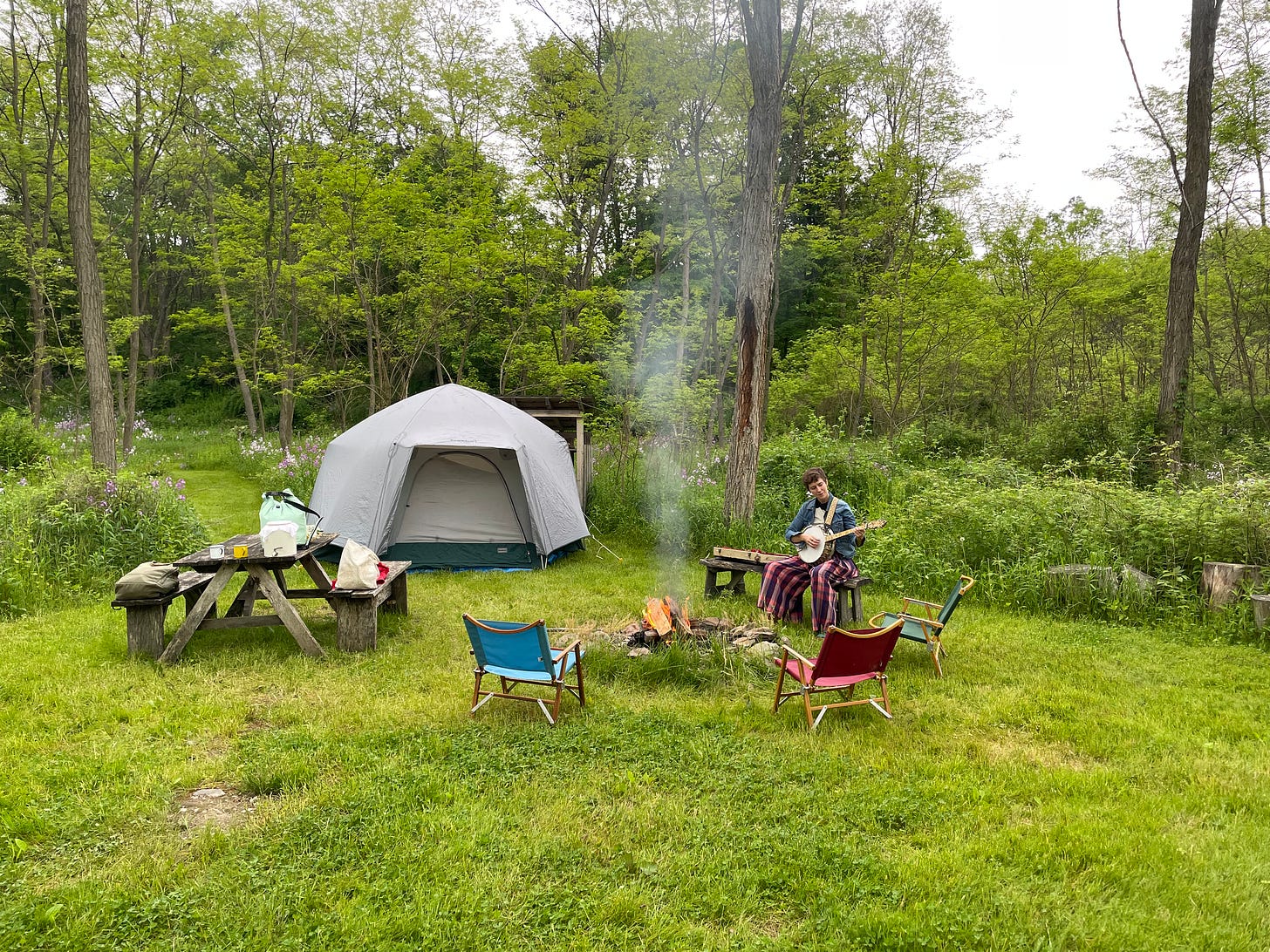
What keeps each of us from orienting our life around some clear and chosen purpose?
Here in the U.S. we’re sold a seductive fantasy of endlessly unfolding options in everything from pasta sauce to romantic partners. Chasing the fantasy of a single best answer instead of rearranging the furniture of our lives to transform how things actually are right now becomes a way to stave off disappointment, which is the annoying little brother of grief.
If what we are tasting of life right now does not satisfy, well— there are endless other versions to reach for before we commit to anything. If we’re unhappy, the fantasy of a perfect city, a perfect job, a perfect partner dangles like the proverbial carrot just up ahead.
Like a fundamentalist vision of rewards in the hereafter, this consumer fantasy keeps us sleepwalking through our work here in the world of matter. There are no incentives to do the housekeeping of improving a workplace or a relationship or a home space or a planet when another better option might lie just up ahead, just out of reach.
I’m not a practicing Catholic any more (sorry, Nana) but in the mornings when the birds are singing in my imperfectly tended garden I like to read monks and mystics, sufis and poets. In the wake of wrecking my little boat of ambition on this reef of a regular life, I’ve come to understand that there’s a reason why contemplative orders spend so much time doing menial housework.
Because the more I clean the house, the more I see that everything is cleaning the house. And the more I let go of chasing satisfaction, the more it starts catching up to me.
A job well done takes time. And as the dust settles, a path begins to clear.
Speaking of dust settling: While I decided not to write about it in this month’s newsletter, a tornado recently struck my town with devastating effects. Our home and family are safe, but many neighbors are not so lucky. Our community foundation has put together a relief fund that you can donate to here if you have the means and the inclination.
Folkist Practice
Little side quests for folks who want to integrate this month’s theme into everyday life. These aren’t affiliate links, just things I want to share!
Rearrange the furniture. I like to travel partly because it means I get to return home again and again and see it from a new angle. This doesn’t require a big travel budget (this weekend we stayed at a friend’s house in the Catskills while he was away). It doesn’t even require leaving town. How could rearranging your living space shake you out of a rut?
Make a cleaning solution that smells good. I’ve made an edited version of this simple vinegar cleaner from my friend Kate.
Move from theory to practice. Some of the smartest people I know talk themselves out of taking concrete steps to do what they care about. Meanwhile, the world is full of jerks who are very good at moving matter to suit their vision. Think about those things you think about, post about, dream about. What tangible actions can you take to align thoughts with actions in physical space?
Carry an orienting object. Rosaries, worry beads, charms, talismans— these are all tools to get grounded when our attention or intention wanders. If you have something you want to remember or accomplish as you swim upstream through the day, a stone in your pocket or a little amulet on a chain can help you remember your internal sense of direction.
Call a friend while you clean the house. Some of my favorite conversations with old friends happen when I’m folding the laundry or flipping The Garret. Menial tasks become easier when we use them to connect.
Folkist Work is a slow-pulse monthly newsletter from me, Nora— a haver of day jobs, maker of folk music, do-er of laundry, and founder of the Folkist Space Residency in Upstate New York. I share resources and mini-essays about using our ancestors’ mostly-free, mostly-analog folk practices to endure a difficult world, work for a better one, and make modern life feel worth living again.


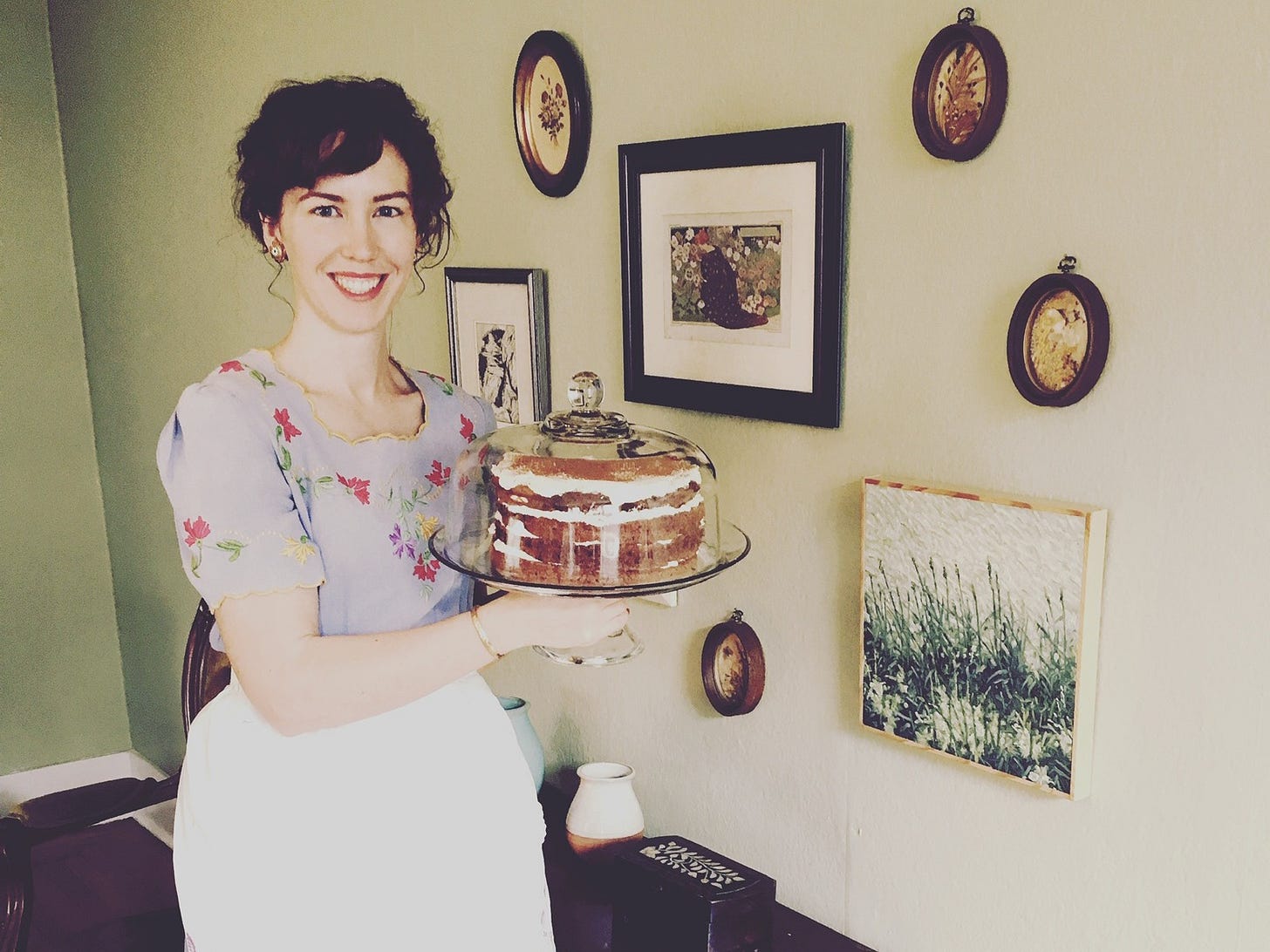
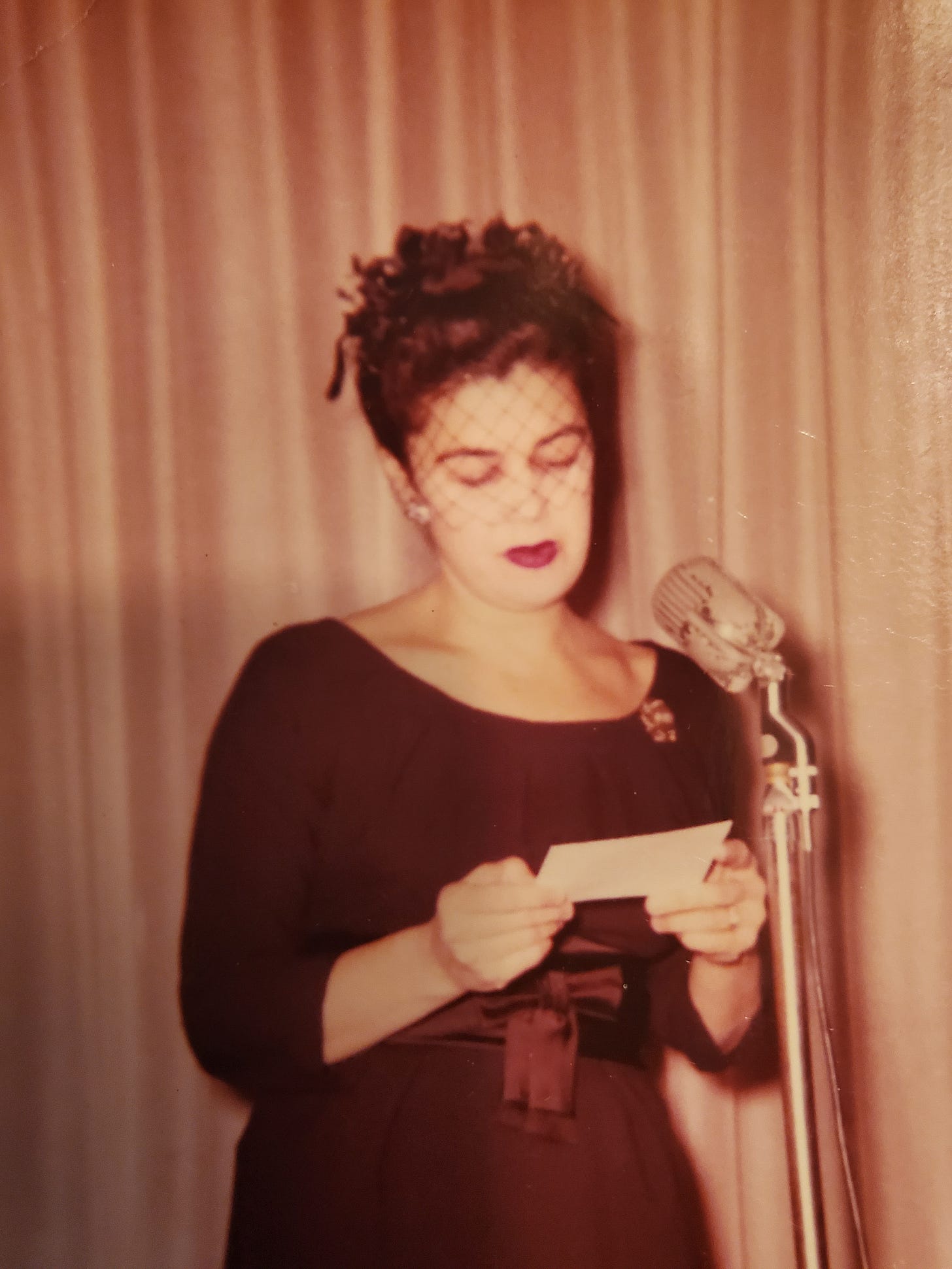
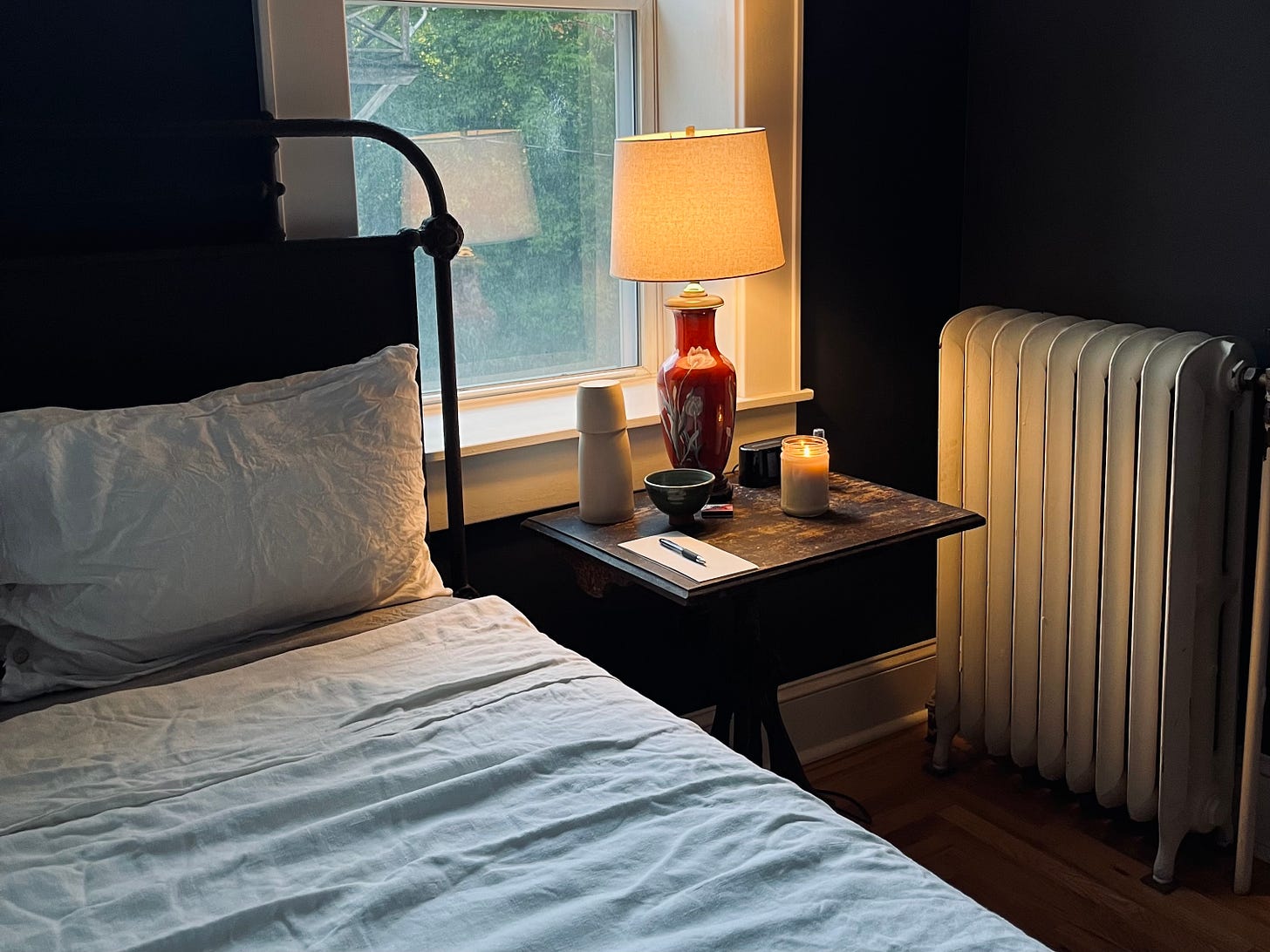

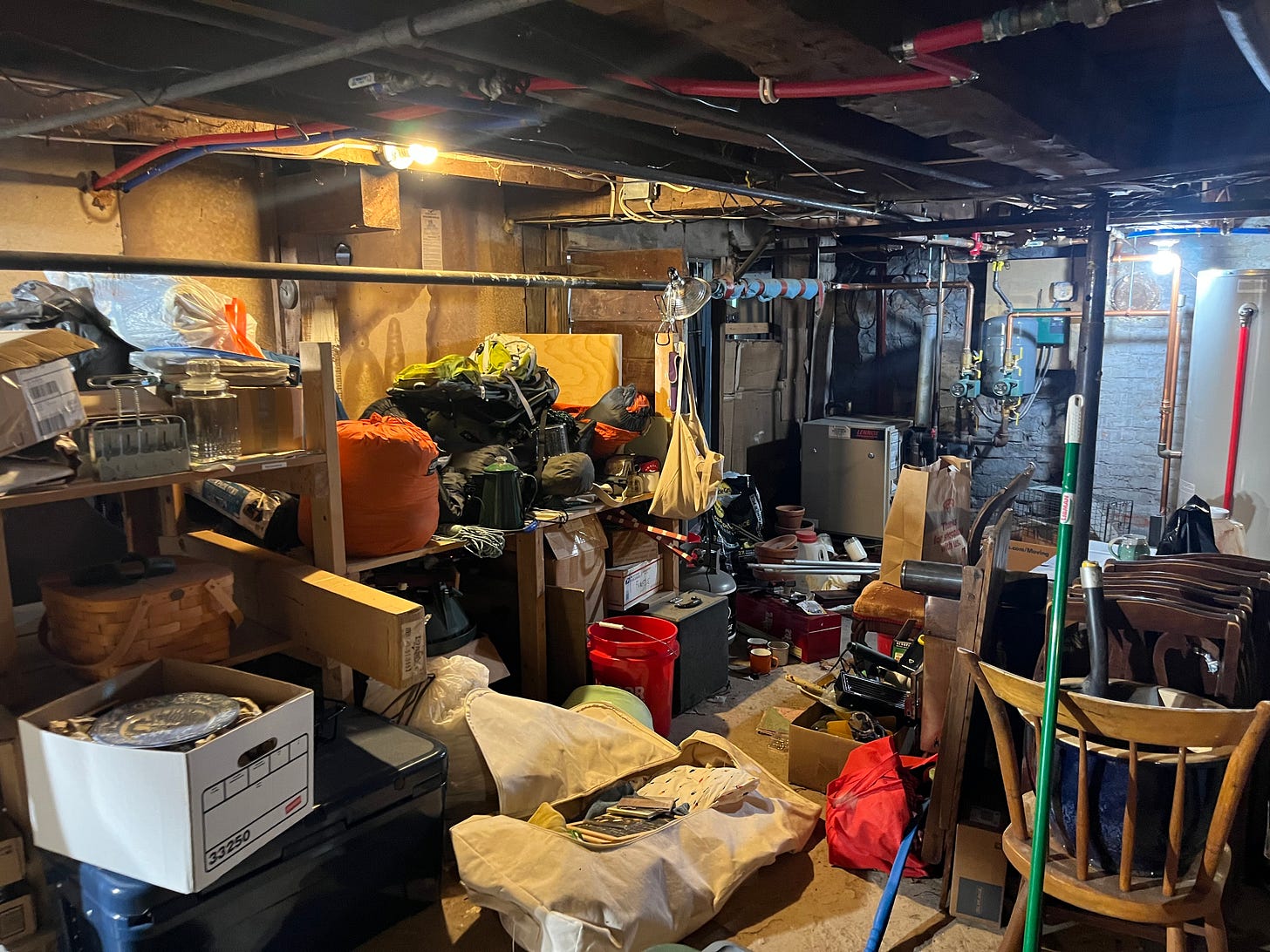
I'm not sure if this is exactly relevant, but you've articulated so well something bouncing around in my head lately.
Women in the US seem only allowed to fit into one of three boxes: 1) homemaker (the only pathway for which in our current popular culture is, I guess, to be a totally submissive tradwife?), 2) working mom (aka evil, feminist lean-in girlboss who has abandoned her children to daycare and is the source of all of society's problems) or 3) single cat lady (which might overlap with lean-in girlboss, but is slightly more acceptable only because she isn't traumatizing children in daycare or whatever - but still often seen as selfish). (I'm not saying any of these archetypes are remotely accurate for anyone, just that there seems to be an assumption that everyone fits into one of them perfectly).
I think as a girl we are very often expected to choose one of these, and then once we chose it, we feel like it betrays our original choice. Like to be one of these things we have to reject all of the pieces associated with the other paths we didn't choose. If I invest in homemaking instead of working in capitalism, I'm betraying feminism. If I want to focus on my work in capitalism, I'm betraying my family. If I want to just do what I want to do - and it's in opposition to the path I'm supposed to be on - who even am I?
What if women are allowed to have elements of all three of these, and even more? What if I like some aspects of homemaking, some aspects of working, and sometimes selfishly doing what I want to do? What if I'm not 100% tradwife, 100% girlboss, or 100% cat lady - but I'm also not 0% of any of them? Our culture seems really unable to handle that. And to be fair, our culture seems really unable to handle any sort of person who doesn't neatly fit into a category.
Anyway, I appreciate this article and I am glad I am not alone. I'm 100% starting over after I've realized my life just wasn't working right. Hoping there's a better path out there for all of us.
Thank you so much for this article. I had a deep feeling of stagnation in my life lately and a lot of procrastination with my creative work and i just realised how much the messiness of my house is overwhelming ( a lot of keepsakes and old things laying around in the house clinging to a distant past). I am moving some matter today !